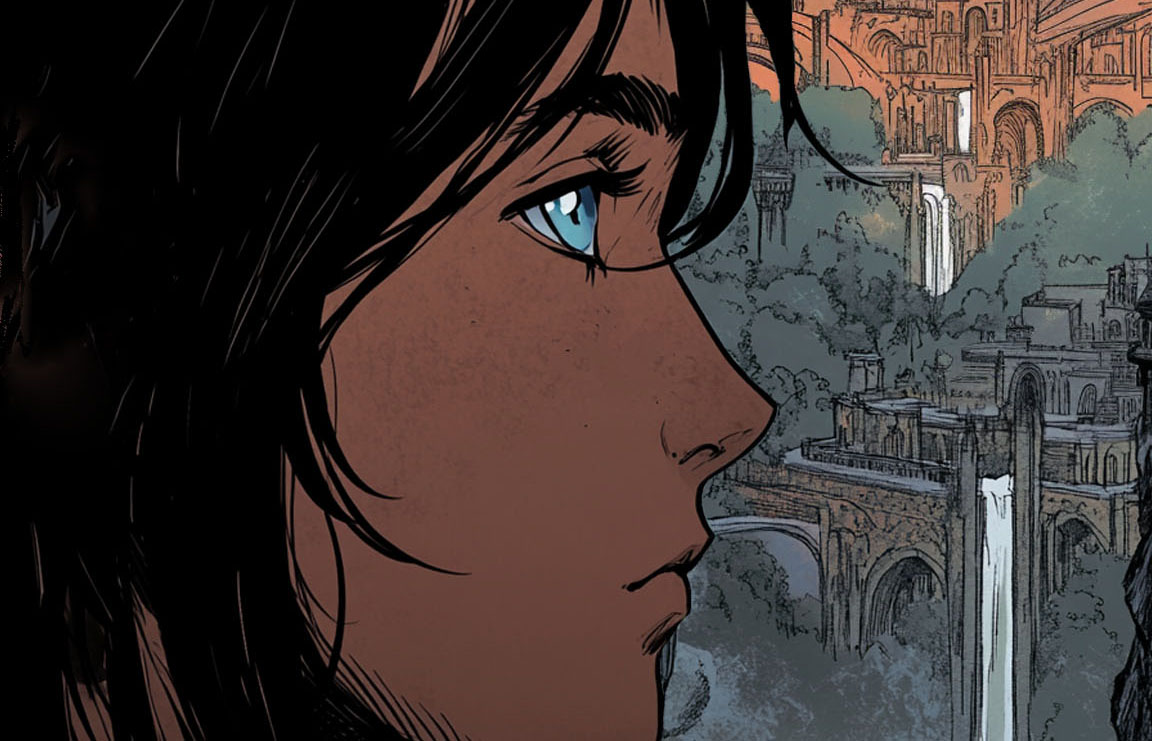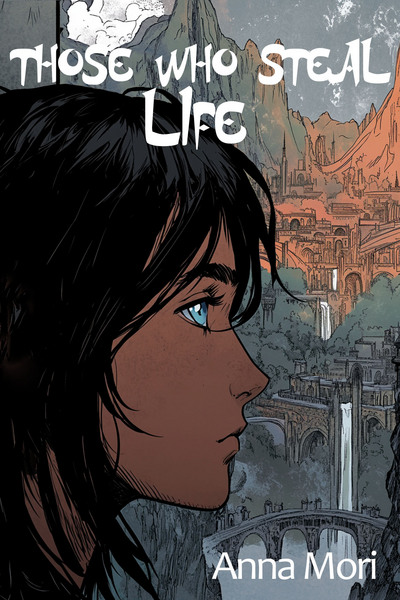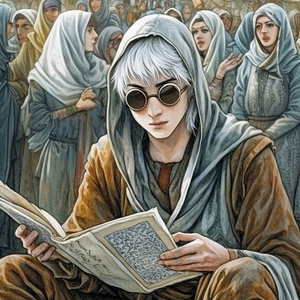Jesus told them, 'Our friend Lazarus has fallen asleep; but I am going there to wake him up.'
— John 11:11
Lyn
The main market square of Bukhara roared with noise — merchants shouting, buyers haggling, the scent of spices and roasted meat thick in the air. Near the old fountain, perched atop an overturned crate, sat a wandering storyteller — a bakhshi. The midday sun, merciless despite it still being spring, blazed overhead. Though shadier spots were available under the canopies scattered around the square, a dense crowd had gathered around the storyteller, pressing forward to see and hear better.
"Once upon a time, in a distant land, there lived a shoemaker named Anil. He was neither rich nor noble, but everyone knew him for his sharp wit and ability to find a way out of any situation..."
The bakhshi spoke unhurriedly, occasionally glancing at the open scroll before him. Judging by the dark glasses covering his face, his eyesight was either poor, or the blinding sunlight was too much to bear. He spoke in Hellenic, but whether it was his native tongue or simply a practical choice for a city that lay at the crossroads of trade routes — and had once been part of Alexander the Great's empire — who could say?
His simple traveling cloak offered no clues to his origins. A few strands of hair, along with a short ponytail peeking from beneath his hood, were unnaturally light — like those of the northern Gauts or the Sveys. Or was it just gray? No, even behind the dark lenses, it was clear: he was still young.
"...One night, while Anil was working late in his shop, a sudden clap of thunder rang out, and right before him appeared God Himself.
'Anil!' proclaimed God. 'You have been chosen!'
Anil raised a skeptical brow. 'Are you sure? 'Cause I kinda had other plans for my life..."
The storyteller's setup was even humbler than that of most bakhshis — no cushions, no raised platform, just a simple cloth spread on the ground, stacked with scrolls. The cloth had ties on all four corners — perhaps so that, if necessary, he could yank them together, bundle everything up in one swift motion, and disappear into the crowd. But why would a storyteller need such an escape plan?
"...'Don't argue,' God thundered. 'I grant you a sacred mission! You shall bring my word to the people, and in return, I will grant you anything you desire.'
'Anything?' Anil pondered. 'Alright then — make it so that all shoes in the world repair themselves. That way, I won't have to work anymore.'
'What?!' God nearly choked. 'That is an absolute waste of a divine gift! Wish for something grand!'
'Okay,' Anil said. 'Then make sure no one ever goes hungry again.'
God frowned. 'Mmm... That's... more complicated than you think. Try something else.'
'Fine! How about this: let all people be happy and never go to war with each other?'
God sighed and stroked His beard. 'Alright, listen... Let's not get into utopias, okay?'
'Then... how about you make my wife stop nagging me for every tiny mistake?'
'No,' God sighed even deeper. 'Even I am powerless against that.'
'Then why are you even here?' Anil asked, baffled.
God opened His book of destinies, flipping through the pages.
'Huh. Turns out I got the wrong address. I was supposed to visit a holy hermit in the mountains, not a shoemaker in the city.'
'I thought as much!' Anil laughed.
'Well, as long as I'm here,' God groaned, 'how about you at least pray to me?'
Anil shrugged.
'Well, since even You make mistakes, maybe I'll also make one... and pray to someone who actually makes the world a better place?'
The storyteller paused. The audience exchanged glances. Some chuckled, some smirked, and some leaned in, eager for the punchline. Lowering his voice, the storyteller imitated the gravelly tone of an old man:
"...'And who might that be?' God asked, frowning.
Anil pointed at his wife, standing in the workshop doorway with her arms crossed.
'Now that,' he said, 'is divine power I actually fear.'
The crowd burst into laughter. Someone clapped a neighbor on the shoulder, a woman in a bright scarf giggled into her fist, and an elderly merchant nodded approvingly.
"...His wife gave him such a look that even God vanished in a cloud of smoke.
And from that day on, Anil lived happily, for he understood: if even God Himself couldn't fix the world, maybe the best thing to do was to simply make it a little better by his own hands, one step at a time.
And of course, he kept repairing shoes."
The storyteller finished and surveyed his audience. People smiled, whispered, repeated the joke about the wife.
"If you enjoyed this tale, I have a much more detailed version written on fine parchment," the bakhshi announced, gesturing to the scrolls laid out on the cloth. "With every twist and turn of Anil's life, his debates with God, and... a few other interesting scenes."
The crowd buzzed.
"Let's see it, then!"
"How much?"
"And why, pray tell, should we spend money when we already know how it ends?" a woman in a headscarf asked skeptically.
A younger girl cut in:
"Oh, you don't know? This is the Blind Bakhshi — haven't you heard of him? His stories always have... extra wisdom for husbands and wives."
She turned to the storyteller with a playful smile.
"I read the one you sold yesterday. It was... incredible."
The bakhshi brightened.
"Then you should try this one too! It contains a very detailed description of Anil's prayer..."
He handed her a scroll, then passed another to a young woman holding a child. Coins — copper and silver — clinked in his palm.
The older woman in the headscarf frowned, suspicious.
"What kind of... wisdom, exactly?"
The younger girl smirked, conspiratorial, and pointed to a passage in the scroll:
"—'So,' Anil's wife purred, twirling a whip delicately between her fingers, 'divine power you fear, is it?'"
The woman's eyes darted over the text. By the middle of the passage, her cheeks had turned crimson, but her gaze refused to leave the page. By the end, her hands trembled with the undeniable urge to read more.
"Alright, fine! I'll take one!" she blurted.
"What if I buy two?" a plump merchant asked. "Do I get a discount?"
Scrolls changed hands one by one. The story found new listeners. And the storyteller knew that tonight, at dinner tables across the city, people would be debating just how useless gods were and how clever shoemakers could be.
Which suited him just fine.
The crowd slowly dispersed, satisfied with the tale and their new scrolls. But one potential buyer lingered, turning a scroll over in his hands, his face pinched with disapproval.
"Good day, miss," he said quietly to the girl who had not yet left. "You said this storyteller told a different story yesterday? About what?"
She brightened.
"Yes! About a girl from Sughd and a Turkic youth — star-crossed lovers who couldn't be together, so they committed—"
Another woman grabbed her sleeve, voice sharp.
"Ata!.. We don't know anything!" she told the man. "We weren't even listening. We were just passing by."
"Really," the man said thoughtfully. "Who has time to listen to storytellers these days?.." And he turned to the bakhshi: "Do you have any scrolls left with that second story?"
"No," the storyteller replied with hostility. "They were selling too well."
"Well, Anil the shoemaker is enough," the buyer tapped the scroll against his palm a couple of times. "Your message is presented in... mmm... an extremely peculiar form, and yet it is quite clear," he said to the storyteller. "This, my friend, is propaganda, blasphemy, an attack on religion itself. A crime against God, the Caliph, the people, and the peace."
The mood in the square had shifted. Those who had just been laughing at the tale of Anil the shoemaker now averted their eyes, stepped back, tried to become invisible. Some slipped into alleyways, others disappeared behind carts. A few merchants hurriedly closed their stalls, turning away as if they saw nothing.
"You're digging too deep," the bakhshi said with a shrug. "I just weave amusing little tales — perhaps a touch risqué at times. Harmless stories, the kind housewives enjoy. Is that a crime?"
"So, in this seditious scribbling of yours, you weren't trying to mock the absurdity of a fanatical faith? A god, supposedly omnipotent, yet incapable of solving the simplest of mortal troubles? And you weren't implying that people should take responsibility for their own world instead of waiting for miracles? You mock God. You teach doubt."
The storyteller beamed.
"Well, isn't it a joy when a tale truly reaches its audience? ...That's what I could say. But, I'm afraid there's no crime here — only your own interpretation of my words. Whether it is truly blasphemous or not, surely that is for theologians to decide, is it not? Such an imagination you have, sir! What is it they say? 'Half the book is written by the reader'?"
By now, the people in the square were no longer just hiding from the heavy sense of foreboding that hung in the air. They were shrinking from something real.
The Arabiya soldiers.
Draped in long black robes, their faces dark and unyielding, the sigil of their caliph emblazoned on their chests, they strode forward with the unhurried confidence of men who knew they were feared. The rumors about them were endless — some whispered they were immortal, others that they could not be harmed.
There were four of them. They moved through the crowd like a blade through water and finally encircled the blind bakhshi.
When the Arabiya took someone, their loved ones rarely saw them again. If they were taken in the presence of the censors, then — well, as their loved ones knew all too well — it was best never to see them again. Let them remain lost. But sometimes, the prisoners were returned. Broken. Voiceless. Sometimes, quite literally — left incapable of forming words, reduced to trembling husks who would spend the rest of their days drooling and soiling themselves.
"The theologians will, no doubt, determine whether this is blasphemy or not," the censor said coolly. "But for an arrest, this will suffice."
He unrolled a scroll and read in a flat, lifeless tone:
"'The lash came down upon his firm, enticing buttocks, leaving a burning red mark, and with the pain came a pleasure unlike any he had ever known...'"
"Ah," sighed the storyteller. "You could at least blush for propriety's sake."
He slipped a hand into his robes — perhaps to tuck away a coin purse, or perhaps to retrieve something else.
"Enough theatrics. You're coming with us. This is pure filth, an attack on moral decency. That is the charge under which you will be arrested."
The blind bakhshi spread his hands in mock surrender.
"Fine, fine... But tell me, with a mind like yours, so quick to unearth hidden meanings — aren't you ashamed of your line of work? A man so clever! They don't like those around here. Aren't you afraid they'll stone you next?"
The censor bared his teeth.
"Intelligence is not a crime," he said. "The Caliph's enemies are not the learned, but those who refuse to submit to him and to Alla. And you, storyteller, are not nearly as amusing as you think."
"Oh, but I am," the bakhshi said, wounded. "And charming, too. Unlike you."
Then, with a sudden, sharp motion, he thrust his hand skyward and clenched his fist.
A deafening crack split the air above the fountain — a firework burst in the sky, showering the square in golden sparks and thick plumes of smoke.
The crowd gasped, stumbled back.
With startling agility for a man who could barely see, the storyteller yanked the cloth beneath him, gathering the last of his so-called blasphemous scrolls into a bundle. He darted sideways, disappearing into the maze of market alleys, vaulting over baskets of fruit and puddles of filth.
Shouts rang out behind him.
"Stop him!"
He ran like the wind, weaving through the narrow streets. To his left, the old market; to his right, rows of carpet stalls. He knew that if he could reach the southern end of the bazaar, he could vanish into the caravan traffic. Beyond that—an endless tangle of courtyards and backstreets...
Behind him, the pounding of boots. Voices, barking orders.
"Stop, heretic!"
The bakhshi twisted sharply around a corner, leapt, caught the edge of a wall, and scrambled onto a rooftop. Flattening himself against the warm tiles, he melted into the shadows.
Below, figures rushed past.
"Where did he go?"
"Find him! The order is clear — dead or alive."
The footsteps faded.
The storyteller exhaled slowly. He reached up and removed his dark glasses, revealing pale gray eyes and a freckled nose.
Then he stretched out on the sun-warmed rooftop, lacing his hands behind his head, letting the sunlight wash over his face. He waited for the voices to disappear entirely.












Comments (0)
See all